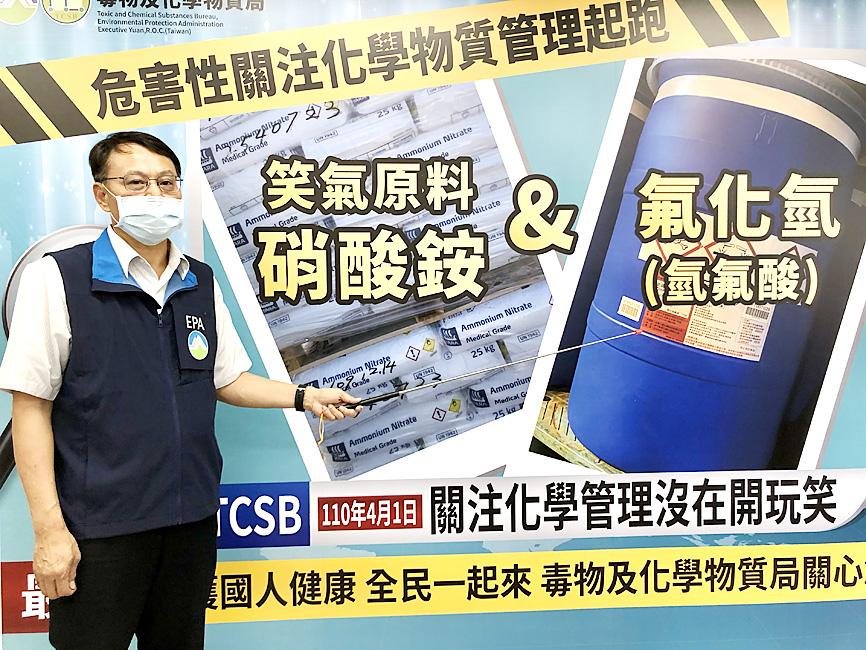Explosive substances such as ammonium nitrate and hydrofluoric acid would be restricted from imports, manufacturing, usage, storage, transportation and sale in Taiwan, the Environmental Protection Administration (EPA) said yesterday.
The agency issued a preview of planned amendments to regulations that are to take effect on July 1.
Hydrofluoric acid, which emerges when hydrogen fluoride is dissolved in water, has caused many injuries in industrial accidents and has been used to maliciously harm people, and should be regulated, Toxic and Chemical Substance Bureau Director-General Hsieh Yein-rui (謝燕儒) said.

Photo: Lo Chi, Taipei Times
An ammonium nitrate explosion in Beirut last year caused at least 210 deaths and 7,500 injuries, Hsieh said, adding that the substance should be regulated.
Ammonium nitrate is also used to produce helium, the first chemical restricted by the EPA, Hsieh said.
The online sale of the substances would be banned, as well as their unlicensed transportation, storage or sale, he said.
The regulations would also require detailed labeling, monthly reports and other measures, Hsieh said.
Contingency measures and other standards would be enforced at factories that handle more than 50,000kg of 80 percent pure ammonium nitrate, and 300kg of solutions with more than 10 percent hydrofluoric acid, he said.
The regulations would stipulate fines of NT$30,000 to NT$300,000 (US$1,051 to US$10,514) for breaches when transporting the substances, Hsieh said.
Contraventions of accident-prevention mesaures would result in fines of NT$30,000 to NT$500,000, he said.
Accidents involving the substances leading to fatalities or injury would be punished with 7 years to life in prison and fines of up to NT$10 million, Hsieh said.
Facilities handling the substances without having insurance or without protective equipment would be fined NT$1 million to NT$5 million, he said.
The EPA had also found that some aluminum cleaning products sold in Taiwan contained hydrofluoric acid, he said.
The agency has asked manufacturers to add warnings to their labeling that inform customers of measures in case of an accident, Hsieh said.

Taiwan is to commence mass production of the Tien Kung (天弓, “Sky Bow”) III, IV and V missiles by the second quarter of this year if the legislature approves the government’s NT$1.25 trillion (US$39.78 billion) special defense budget, an official said yesterday. Commenting on condition of anonymity, a defense official with knowledge of the matter said that the advanced systems are expected to provide crucial capabilities against ballistic and cruise missiles for the proposed “T-Dome,” an advanced, multi-layered air defense network. The Tien Kung III is an air defense missile with a maximum interception altitude of 35km. The Tien Kung IV and V

The disruption of 941 flights in and out of Taiwan due to China’s large-scale military exercises was no accident, but rather the result of a “quasi-blockade” used to simulate creating the air and sea routes needed for an amphibious landing, a military expert said. The disruptions occurred on Tuesday and lasted about 10 hours as China conducted live-fire drills in the Taiwan Strait. The Civil Aviation Administration (CAA) said the exercises affected 857 international flights and 84 domestic flights, affecting more than 100,000 travelers. Su Tzu-yun (蘇紫雲), a research fellow at the government-sponsored Institute for National Defense and Security Research, said the air

Trips for more than 100,000 international and domestic air travelers could be disrupted as China launches a military exercise around Taiwan today, Taiwan’s Civil Aviation Administration (CAA) said yesterday. The exercise could affect nearly 900 flights scheduled to enter the Taipei Flight Information Region (FIR) during the exercise window, it added. A notice issued by the Chinese Civil Aviation Administration showed there would be seven temporary zones around the Taiwan Strait which would be used for live-fire exercises, lasting from 8am to 6pm today. All aircraft are prohibited from entering during exercise, it says. Taipei FIR has 14 international air routes and

Taiwan lacks effective and cost-efficient armaments to intercept rockets, making the planned “T-Dome” interception system necessary, two experts said on Tuesday. The concerns were raised after China’s military fired two waves of rockets during live-fire drills around Taiwan on Tuesday, part of two-day exercises code-named “Justice Mission 2025.” The first wave involved 17 rockets launched at 9am from Pingtan in China’s Fujian Province, according to Lieutenant General Hsieh Jih-sheng (謝日升) of the Office of the Deputy Chief of the General Staff for Intelligence at the Ministry of National Defense. Those rockets landed 70 nautical miles (129.6km) northeast of Keelung without flying over Taiwan,